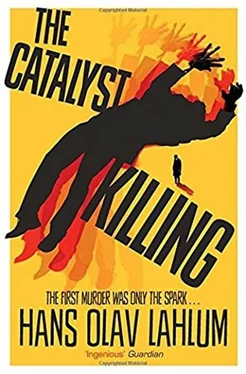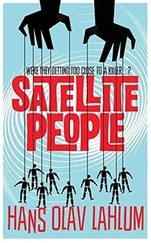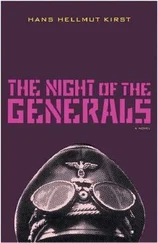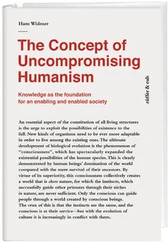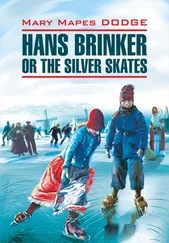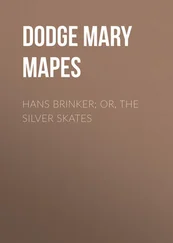‘I am, of course, extremely curious to know what I have done to merit this unexpected visit from a keeper of law and order? Surely it cannot be in connection with the still unsolved murder of my old friend, Marius Kofoed, in which the police showed a remarkable lack of interest following liberation in 1945?’
I started by reassuring him that it was simply a matter of routine questions, and that he was not suspected of having done anything criminal. Christian Magnus Eggen proceeded to answer my questions succinctly, in a curt voice.
When he turned seventy, he had retired as director of his own company, which he had run for thirty-two years without any form of complaint. He now lived very comfortably on his pension and savings. His wife had died following an illness a few years earlier, and as his son had fallen in the fight against the Bolsheviks in Stalingrad, he was now a widower with no heirs. So his life was just fine, thank you very much, but his previous experience of the Norwegian police was not very pleasant and he now simply wanted to be able to live in peace for what time he had left. In short, he was still curious as to why I had now come to disturb a law-abiding and respectable citizen in his own home.
I took the liberty of reminding Christian Magnus Eggen that he had not always been a law-abiding citizen. He snorted in contempt and replied that he had never broken the law of the day – what happened in 1945 was that the law was amended with retrospective effect. He would never have believed that one could be punished in Norway for nothing more than being a member of a political party. And in order to avoid any chance of experiencing something similar again, he had not been politically active since. After all, he remarked snidely, it was impossible to know whether the socialists might suddenly decide tomorrow to ban any of the right-wing parties with retrospective effect.
We had not got off to a good start. And I did not make things any better by allowing myself to be provoked into asking if he denied any knowledge of the persecution of the Jews during the war.
‘What persecution of the Jews?’ he challenged, looking me straight in the eye.
‘The Holocaust – the genocide of six million Jews, organized by Hitler’s Germany and supported by Quisling’s NS,’ I replied, also with a certain antagonism.
He rolled his eyes.
‘So even senior civil servants have allowed themselves to be brainwashed by the lies of their parents. What you call the Holocaust is an illusion based on exaggerated lies. A few Jewish criminals were executed, as more criminals and antisocial elements should be. But the Jews themselves are primarily to blame for their persecution in Germany. After all, they chose to stay there rather than give up their businesses, despite all the well-intentioned warnings. It was never a case of industrial genocide. I went there myself and saw the so-called annihilation camps – and they simply did not have the capacity to do anything like that. There are no documents signed by Hitler or members of his government to authorize anything of the sort. Some members of the German army may, at the height of the war, have overstepped their orders to tackle antisocial elements, but there was never an organized genocide.’
I stared at the man on the sofa with horrified fascination. His smile was bitter.
‘Next you’ll be saying that you believe the lie that Norway was occupied by the Germans. There was no German occupation; it was a rescue operation to save Norway from becoming part of the British Empire. There is evidence that the British had already started their invasion and had laid out mines in Norwegian territorial waters when the Germans arrived. And when the government and king decided to leave the country on 7 June 1940 rather than stay here to serve their people, Norway was no longer at war. In 1945, I and many other law-abiding citizens were convicted of being war criminals in a country that had not been at war, because we had used our given right to express our political views while obeying the laws that were current at the time.’
It was not easy to argue with the increasingly passionate Christian Magnus Eggen, partly because he was agitated and talking so fast, but also because I was at a bit of a loss and my knowledge of wartime Norway was obviously inferior to his. So I simply said that his understanding of the war was obviously very different from my own – and that given in Norwegian history books – but that that was not why I had come to see him. He gave an impatient nod, and then calmed down a bit and waited.
When we finally got down to business, Christian Magnus Eggen’s story was more or less the same in content as Frans Heidenberg’s, despite their outward differences. Marie Morgenstierne was just a name that he had read in the week’s newspapers. But he had first heard of Falko Reinhardt as a prominent young communist. When he then received a letter from him, with some questions about his experiences during the war, he had not wanted to waste ‘five minutes and a stamp’ on the answers. He had instead said exactly what he thought when Falko Reinhardt subsequently called him. He had thus spoken to Falko Reinhardt on the telephone for a couple of minutes, but had never seen the man.
As it was so long ago, Christian Magnus Eggen could no longer say what he had been doing on the night that Falko Reinhardt disappeared, but he could guarantee that he had not been in Valdres. He had been at home alone on the evening that Marie Morgenstierne was shot.
He did not, however, understand why he had to answer these questions about two people he had never met or had any significant contact with. He had no kind of motive whatsoever, and there was absolutely nothing to link him to the scene of the crime. And in any case, he added with a sarcastic smile, no one knew for certain that one of them had been the victim of a criminal act.
I was starting to feel very angry. I said that some information had come to light that could indicate that he had been a member of a Nazi network during the war.
Christian Magnus Eggen snorted with even more contempt than before. He had done nothing more than be involved with the lawful activities of a political party that was legal at the time, and was engaged in the fight to save Norway from the threat of communism. He had been a member of the NS and done business with the Germans, but had not played a central role or been part of any network. And in later years he had minded his own business, paid his tax and not been politically active in any way. In addition, his right to vote had been suspended for a decade after the war due to his political affiliations, and he had since chosen not to use it in protest. The Conservatives and Labour were all the same to him. He had, however, continued to have contact with Frans Heidenberg and a few other old friends, which, as far as he was aware, was still not illegal.
To this, I asked if Henry Alfred Lien from Valdres was one of the old friends with whom he had kept in touch.
He shook his head in irritation. He had only met Lien briefly a couple of times during the war, and he had never been in Valdres. And what was more, the government and police should stop wasting taxpayers’ money on recording who he kept in touch with or speculating about what he might think about social developments, so long as he paid over fifty thousand kroner a year in tax and did not break the law.
And so I had to stop there for the time being. I had no problem whatsoever imagining Christian Magnus Eggen as a criminal and traitor. He seemed to be the prototype of a bitter old Nazi. Everything he said sounded like self-justification. He was certainly high on the list of people I had met in the course of this investigation who I would be more than happy to arrest. At the top, in fact.
Читать дальше
